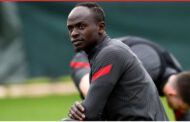After all the fall-out, the football. A classic clash, Portugal manager Fernando Santos had called it the day before, and it turned out he wasn’t far off. Twice Portugal led, twice Spain equalised, and then they took a lead that felt like a liberation, but with one minute to go Cristiano Ronaldo curled in a wonderful free-kick to complete a hat-trick and give a superb night an unexpected ending.
For all that other stuff sometimes seems to eclipse the game, for all that it can feel like the garnish has eaten the steak, in the words of one Spanish coach, the game fights back. Football tends to find a way.
Here, Spain found a way. Ronaldo certainly did. Portugal almost got a winner, too, right at the death – twice, in fact – but that would have been even harsher on Spain than the result already was. Portugal had three efforts on target, just five overall, and all three went in. After the days they have had, seeing their manager announce a move to Real Madrid in the afternoon and their president sack him the following morning, listening as the federation and Madrid accused each other, defeat might have hurt Spain. Yet for most of the night here there was little sign of any lasting effects of what Sergio Ramos called “delicate days”.
Perhaps it was simple: perhaps recovery was always most likely to come with the opportunity to get back to what they know: playing football very, very well. They might have lost their manager two days before the World Cup but Spain are still Spain.
And Ronaldo is Ronaldo. Spain didn’t win because of him, and in part because of a mistake from David de Gea too, but while the late equaliser may leave regret, there should be comfort in the fact that even conceding after three minutes hadn’t sunk them. Nor did conceding a daft second just before half-time. Spain have Isco, Andrés Iniesta and David Silva, after all. They also have Diego Costa: the one big doubt, even from Julen Lopetegui’s era (all of three days ago now) appeared at their moment of greatest need, scoring twice.
Any vulnerability was tested immediately, just two minutes gone when Ronaldo tumbled over Nacho to win a penalty from which he opened the scoring. The clock showed 3.30. Five minutes later, Spain appeared to still be disoriented, denied the thing that makes them Spain: the ball. It didn’t last. Costa laid off to Silva who hit over and bit by bit Spain worked their way in, Isco taking responsibility to get them going. The risk though remained – in the air and on the run, Portugal looked faster, stronger, higher.
Portugal’s intention had appeared clear after just 47 seconds when Pepe waved Gonçalo Guedes forward and sent it long towards him. Guedes is swift indeed, but twice he failed to finish dangerous breaks, his team tearing through the middle. On the first, he seemed unsure what to do, doubting whether Ronaldo was going to join the run. On the second, a slick, precise move that released Bernard Silva on the right saw Ronaldo drop it off to him in the area but he was indecisive.
While Spain had the ball, Portugal carried arguably the great threat. But then, suddenly, Costa did what Costa does. He may feel like an awkward fit with Spain at times, but he is good at this and he brought them level, gave them life and changed the game. Maybe changed Spain’s tournament too.
He leapt with Pepe, crashing into him, forearm first. Pepe tumbled, Costa continued. He turned, stopped, bumped, turned again, away from José Fonte and Cédric Soares, and struck into the bottom corner, three men lying on the floor inside the Portuguese penalty area. Spain’s substitutes raced from the bench, as if they were released. As if they all were.
This game, though, had a lot more left in it. Isco thumped a shot off the underside of the bar that landed plumb on the line and although Spain were denied, it seemed they were back: the ball moving fast, Isco and Iniesta combining, Jordi Alba whizzing along outside. A sharp combination between Costa, Isco, Iniesta, and Alba finished with Iniesta’s shot skidding past Koke and just wide.
In truth, clear chances were few and Portugal speared passes into space beyond Spain, for whom corners often felt more like a concern than an opportunity. Guedes, Silva, and Ronaldo led the race and just before the break, Guedes controlled near the edge of the area and laid back to Ronaldo. His shot was simple enough but it slipped in off De Gea’s hands and into the net.
The remedy came fast. A planned free-kick – presumably Lopetegui’s legacy – saw Iniesta clip to Sergio Busquets, who nodded back across the six-yard box, and Costa finish from close range. And then, two minutes later, as Spain worked their way in on the left once more, a sliced clearance came to Nacho on the edge of the area. He thumped the ball on the bounce and it flew in off both posts. The touch and passing had been good before; it was impeccable now. Spain took control, the ball theirs. There was even the occasional olés amidst the fans trying to get a Mexican wave going.
If that sounds like Spain, they looked like Spain too. They also looked set for an impressive, therapeutic and deserved victory. But, as Fernando Hierro, the man who never expected to be standing there on the touchline, said: “When there’s someone like Ronaldo out there these things can happen.”
The Guardian (UK)














